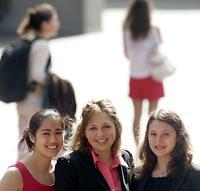3 UW success stories land 3 world-class scholarships

With commencement three weeks away, many University of Washington students are looking forward to finishing their studies — forever.
Then there are three seniors with unusual ambitions and talents who together have landed their school a rare honor.
Eliana Hechter wants to unravel the mathematical mysteries of cohomology and infinite-loop spaces — whatever those are. Lesley Everett hopes to use genetics to fight diseases such as diabetes and AIDS. And Sariah Khormaee wants to develop artificial corneas to help people regain their sight.
Together, they have won three of the world's most prestigious scholarships — Rhodes, Gates Cambridge and Marshall. Each award gives the student a full ride to a top university in the United Kingdom. Each year, just 32 U.S. students win the Rhodes, 40 win the Marshall and about 40 win the Gates Cambridge.
This year marks the first the UW has become a triple winner.
"I think it's a wonderful reflection of the quality of students coming into the university," said UW President Mark Emmert. "Their ability to conduct research as undergrads at the University of Washington distinguishes them from students at other institutions, and I think that's been key to winning these awards."
The women, who have become friends, already are planning their fall trips — that is, when they are not studying, performing in a harp ensemble, competing in ultimate Frisbee or helping homeless youths at a Seattle shelter.
"We are really proud of them. It's a mark of distinction for the UW," said chemistry professor Joe Norman, who met all of the women through an honors seminar. "They're each unique and outstanding in different ways."
Hechter, 18, now a Rhodes Scholar, grew up on Queen Anne and attended Seattle Country Day School. She was such an early achiever that she skipped high school and began her UW studies at age 14. She had exceptional writing skills from an early age, said her father, Michael Hechter, a professor of global studies at Arizona State University.
"Her mother and I thought she'd be studying humanities. This whole thing with math kind of caught us unaware," he said.
Michael Hechter said he believes his daughter's competitive streak might have been spurred on by subtle gender discrimination in the discipline.
A gender gap was apparent in a freshman class Hechter was teaching at the UW on Thursday, which included 16 men and one woman. On the blackboard, above some complicated formulas, Hechter had written: "In honor of the Da Vinci Code coming out tomorrow ... A lecture in cryptography!"
"The best way for me to get interested is through metaphor and example," said Hechter, who once rewrote a professor's notes to make them more understandable. (For the record, she says cohomology has to do with holes in space. It's complicated.)
Hechter, who plays ultimate Frisbee, will graduate with a bachelor's degree in math. She has three ambitions: to become a math professor, to write a novel and to advocate for more diversity in math education.
She'll have plenty of time. She's planning to finish her Ph.D. at the University of Oxford by age 21.
Everett, 21, who won the Gates Cambridge Scholarship, is a relative latecomer to academic success. She grew up in Port Angeles and attended the town's only high school. Then it was on to the UW.
"I didn't come here with any great academic expectations. I was just going to be one of the many," she said. "But being in the honors program truly defined my whole experience here."
Everett said the program allowed her to click with a much more intimate group of peers and faculty and begin to appreciate how she could use her hard-science background in improving public health.
"She's the type of student you could see grow and change as a result of attending college," Norman said. "In her unassuming way, she took advantage of everything here."
Everett, who enjoys taking long bike rides, will graduate with a bachelor's degree in biochemistry and plans to study epidemiology at the University of Cambridge. A volunteer at the 45th St. Youth Clinic in Seattle, Everett said she would one day like to do the type of work supported by organizations such as the Bill & Melinda Gates Foundation.
The winner of the Marshall scholarship, Khormaee, is in her early 20s (she shies away from giving her exact age) and grew up in Vancouver, Wash., the daughter of a Chinese-American mother and Iranian father. Her interest in ophthalmology stems, in part, from her grandmother, who suffered from glaucoma.
Khormaee developed a strong interest in harps at the UW and Thursday night was performing as part of an ensemble alongside five other harpists. She also enjoys running, biking and canoeing.
She will graduate from the UW with bachelor's degrees in neurobiology and biochemistry. She will attend the University of Cambridge School of Medicine and eventually plans to become a physician.
"The opportunities for students at the UW are unparalleled," Khormaee said. "Whatever you wish to pursue, there are people there to help you reach your goals."
Nick Perry: 206-515-5639 or nperry@seattletimes.com